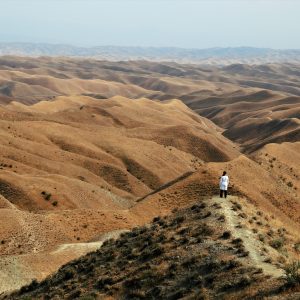Federal Water Tap, February 12: Reservoirs in Colorado and Texas Gain Endorsements
The Rundown
The Army Corps approves a reservoir in northern Texas while energy regulators weigh in on Denver’s proposal to store more Colorado River water by raising a dam. Congress passes a budget deal with additional disaster aid. The Defense Department submits its first National Defense Strategy — which omits climate change in the unclassified summary. And lastly, it’s a hot, dry winter in California and the Colorado River basin.
“what if a much of a which of a wind/gives truth to summer’s lie/bloodies with dizzying leaves the sun/and yanks immortal stars awry?” — e.e. cummings
EPA Administrator Scott Pruitt, who so frequently talks about the need for certainty, suggested in an interview at a TV station in Las Vegas that people today would be presumptuous to say what temperatures would be desirable 80 years hence. Sowing doubt about the aims of climate science, Pruitt suggested that it is “arrogant” to claim to know the ideal temperature in 2100. In many regions, though, hotter means worse. Several studies have shown that continued temperature increases will lead to deadly daytime outdoor working conditions.
By the Numbers
131 feet: Proposed increase in the height of Gross Dam, in Colorado. Energy regulators, one of several agencies that must evaluate the project, indicated their approval. (FERC)
News Briefs
Budget Extension
See wall. Run at wall. Hit wall. Repeat.
After a shutdown that lasted no longer than the night shift, Congress approved another budget extension, this time to March 23. The deal also unlocks new spending for disaster aid:
- $2.3 billion to the U.S. Department of Agriculture to pay for crop losses from hurricanes and wildfires.
- $165 million to the Rural Utilities Services for grants to rebuild water and sewer systems damaged by the three big hurricanes last year.
- $15 billion to the U.S. Army Corps of Engineers for repairing storm damage.
Energy policy observers noted some positive news in the budget deal — extension of tax credits for renewable energy and, more controversially, for carbon capture.
Denver’s Move for More Water
Federal energy regulators said that the Denver water utility’s plan to increase diversions from the Colorado River and expand a dam would not have a major environmental effect.
FERC endorsed Denver Water’s plan to increase the height of Gross Dam by 131 feet and triple its storage capacity. Some 465 acres that will be submerged by the larger reservoir will be cleared of trees, amounting to an estimated 50,000 tons of cuttings.
The supplemental environmental review examined impacts to wetlands, wildlife, water quality from mercury, and seismic hazards. Some public comments questioned the effect of climate change on water supplies, but that line of inquiry was not within the scope of the evaluation.
North Texas Reservoir OK’d
The Army Corps of Engineers submitted its final approval for the Lower Bois d’Arc Creek reservoir, a project that will supply 120,000 acre-feet of water per year to cities north of Dallas. Construction is scheduled to be completed by 2022.
The project required a Clean Water Act permit from the Corps because it will destroy nearly 6,000 acres of forest bottom wetlands. The damage will be offset by restoring creeks and wetlands on a ranch downstream of the reservoir site.
National Defense Strategy
The Defense Department released the unclassified version of the National Defense Strategy, the first such review after Congress changed the department’s security assessment procedure last year. Climate change, noted in department documents produced during the Obama administration as a risk to national security, was not mentioned in the strategy.
A Congressional Research Service report states that Congress will have to decide whether the omission should mean allocating fewer resources to climate programs within the military.
Studies and Reports
Hot West, Cold East
Six of the seven U.S. states in the Colorado River basin recorded their warmest November to January on record, according to the National Climate Data Center. Four of those states — Arizona, Colorado, Nevada, and Utah — registered one of their top-ten driest periods for those three months.
In the spring/summer snowmelt period, Lake Powell is forecasted to receive roughly half of average inflow, some 3.4 million acre-feet. If February continues a warm-dry pattern, that amount will drop. That’s a long-term trend in motion: researchers expect precipitation to generate less runoff as temperatures warm.
The East, meanwhile, has been frigid, with some 4,000 daily cold temperature records in January, the coldest of the last three months. But, in the broader view, the cold hasn’t held. Only one state registered a top-ten coldest January. Over the last three months, most of the East has been near average. Cold today is not what cold used to be.
On the Radar
Budget and Infrastructure
President Trump is set to announce the administration’s fiscal year 2019 budget proposal and something related to infrastructure.
Reuters cites an unnamed official who says that the infrastructure details will be “principles, which will outline a plan.” It’s enough feinting to bring to mind this scene from The Waterboy.
The outline of the principles is, by this point, well known: local governments will be encouraged to raise funds and the federal government will quicken the permitting process, cutting it down to perhaps two years for major projects.
House Water Infrastructure Hearing
The other chamber takes up the water infrastructure discussion with a hearing on February 14.
Environmental Justice Council Meeting
The group that advises the EPA on environmental outcomes for poor and minority communities meets on March 8. Members will discuss their water infrastructure finance initiative.
Federal Water Tap is a weekly digest spotting trends in U.S. government water policy. To get more water news, follow Circle of Blue on Twitter and sign up for our newsletter.
Brett writes about agriculture, energy, infrastructure, and the politics and economics of water in the United States. He also writes the Federal Water Tap, Circle of Blue’s weekly digest of U.S. government water news. He is the winner of two Society of Environmental Journalists reporting awards, one of the top honors in American environmental journalism: first place for explanatory reporting for a series on septic system pollution in the United States(2016) and third place for beat reporting in a small market (2014). He received the Sierra Club’s Distinguished Service Award in 2018. Brett lives in Seattle, where he hikes the mountains and bakes pies. Contact Brett Walton





